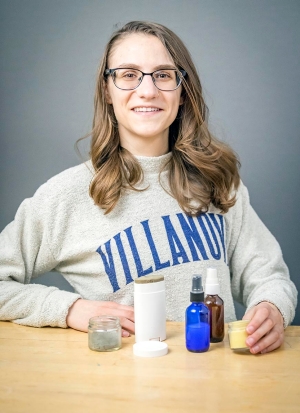Eyeing the Aerospace Industry: Alicia Piscatelli, PhD student

Piscitelli not only studies sustainability, she practices it in her daily life. A few years ago she began making her own skincare products after considering the impact beauty products and packaging have on the environment. She researched less harmful replacements and learned how to make her own alternatives. “It’s a lot of fun, kind of like cooking. I enjoy trying different ingredients and seeing what works and what doesn’t.” She adds, “Creating a no-waste cosmetic company someday would be really cool.”
Who: Alicia Piscitelli, graduate student, Sustainable Engineering
Lifelong passion: Introduced to sustainability at a young age, Alicia recalls, “My parents always practiced green living; we had a garden, composts and canned our own food.” Her own interest blossomed during college. As an undergraduate chemical engineering student, she became involved with The Wells Project, a non-profit organization that raises awareness about the worldwide water crisis. Piscitelli knew she wanted to continue learning about sustainability after graduation and enrolled in Villanova’s Master of Science in Sustainable Engineering program.
Industry Connections: As an MSSE student, Piscitelli participated in the RISE (Resilient Innovation through Sustainable Engineering) Forum, a corporate partnership program that connects students with company-defined sustainability projects. She was chosen to lead a life-cycle assessment project with Boeing and her work with the company continued during a summer internship.
Aerospace & Sustainability: As Alicia learned more about Boeing she became intrigued, as the aerospace industry isn’t typically associated with sustainability. She asked employees where they saw opportunities for increased sustainability and learned that while composites used to build airplanes increase fuel efficiency, they cannot be recycled. She explains, “The life of an airplane is about 30 years and since they were only recently built using composites, there is still an opportunity to find a sustainable solution.”
A biomimicry course taught by Ross Lee, PhD, allowed her to research alternatives to the non-recyclable composite materials. She notes, “I dug deep into the way aircrafts work today and how technology in the future could change.” Piscitelli found a biomimetic solution inspired by whale fins that would reduce drag and improve lift, increasing the fuel efficiency of the plane. This proven method is successfully used on wind turbines today. She also explored a recyclable composite material called a reversible thermoset, a solution that further fueled her curiosity.
Pursuing a PhD: Motivated by the prospect of new solutions, Piscitelli worked closely with Dr. Lee, who specializes in polymers and plastics. With the knowledge she gained in his classes and her experience with Boeing, she decided to take her research a step further and continue her studies in Villanova’s PhD program. With a concentration on polymers and plastics, she plans to do her thesis on recyclable composite materials.
